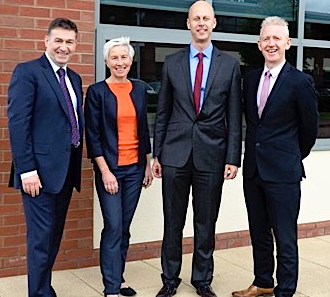Only a fifth of IT decision makers in large multinational corporations are confident that their organisation is fully prepared against the threat of cyber-criminals.
The majority of companies feel constrained by regulation, available resources and a dependence on third parties when responding to attacks, according to new research from BT and KPMG.
The study also flags up the need for budgets to be adjusted, with 60% of decision makers reporting that their organisation's cyber security is currently financed by the central IT budget while half of those (50%) think it should come from a separate security budget.
One major challenge identified by the report is the funding and scale of R&D spending that the criminals can bring to bear on breaching the defences of target companies.
The report, 'Taking the Offensive - Working together to disrupt digital crime', finds that, while 94% of IT decision makers are aware that criminal entrepreneurs are blackmailing and bribing employees to gain access to organisations, roughly half (47%) admit that they don't have a strategy in place to prevent it.
The report also finds that 97% of respondents experienced a cyber-attack, with half of them reporting an increase in the last two years.
At the same time, 91% of respondents believe they face obstacles in defending against digital attack, with many citing regulatory obstacles, and 44% being concerned about the dependence on third parties for aspects of their response.
Mark Hughes, CEO Security, BT, said: "The industry is now in an arms race with professional criminal gangs and state entities with sophisticated tradecraft.
"The 21st century cyber criminal is a ruthless and efficient entrepreneur, supported by a highly developed and rapidly evolving black market. Businesses need to not only defend against cyber-attacks, but also disrupt the criminal organisations that launch those attacks. They should certainly work closer with law enforcement as well as partners in the cyber security marketplace."
Paul Taylor, UK Head of Cyber Security, KPMG said: "It's time to think differently about cyber risk - ditching the talk of hackers - and recognising that our businesses are being targeted by ruthless criminal entrepreneurs with business plans and extensive resources - intent on fraud, extortion or theft of hard won intellectual property.
"Talking generically about cyber risk doesn't deliver insight."
The conclusions of the research point to the need to change mindset and to regard security not simply as a defence exercise. It is, in fact, the enabler that facilitates digital innovation and ultimately drives profit.
BT and KPMG are now engaging with large organisations around the world to debate the learning points of their joint research and advise on the changes that need to be undertaken.

 Novosco has acquired NetDef in a seven figure deal that sees the managed cloud provider increase its workforce to 140 and add a security specialism to its service offering.
Novosco has acquired NetDef in a seven figure deal that sees the managed cloud provider increase its workforce to 140 and add a security specialism to its service offering. Former RAF squadron leader Paul Diamond has joined Entanet as Chief Operating Officer with a remit to drive efficiencies and quality assurance.
Former RAF squadron leader Paul Diamond has joined Entanet as Chief Operating Officer with a remit to drive efficiencies and quality assurance.